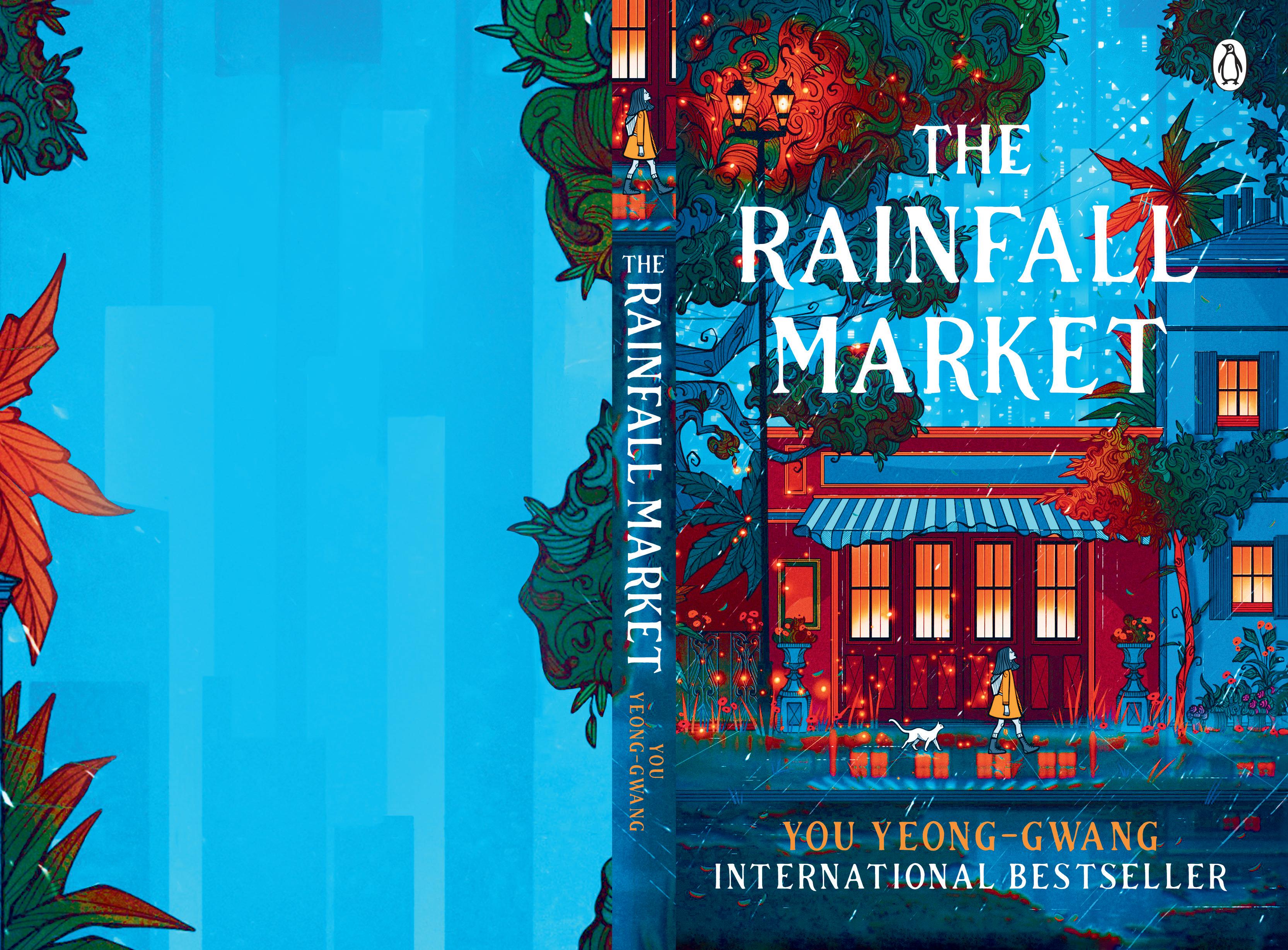

The Rainfall Market
You Yeong-Gwang was born in Seongnam in 1984. He wrote this story during breaks while delivering food for a living. He felt truly happy while writing this story and wishes for all readers to find healing and courage through it so that they may go out and find their own happiness. The Rainfall Market was a runaway bestseller in Korea selling over one hundred thousand copies and has been sold in fifteen languages.
The Rainfall Market
YOU YEONG-GWANG
Translated by Slin Jung
PENGUIN BOOK S
UK | USA | Canada | Ireland | Australia India | New Zealand | South Africa
Penguin Books is part of the Penguin Random House group of companies whose addresses can be found at global.penguinrandomhouse.com
Penguin Random House UK, One Embassy Gardens, 8 Viaduct Gardens, London SW 11 7BW penguin.co.uk
First published in Korea as The Rainbow Goblin Store by Clayhouse 2023 First published in Great Britain by Penguin Michael Joseph 2024
Published by Penguin Books 2025
Copyright © You Yeong-Gwang, 2023 English translation copyright © Slin Jung, 2024
Contents page image © Jedit (@9jedit); Serin character image © Tithi Luadthong, Shutterstock; Issha character image by Lady Zhegalova via Pixabay; Mata & Popo character images by Dmitry Abramov via Pixabay; all other character images by LeoNeoBoy via Pixabay
This book is published with the support of the Literature Translation Institute of Korea (LTI Korea)
The moral right of the author has been asserted
Penguin Random House values and supports copyright. Copyright fuels creativity, encourages diverse voices, promotes freedom of expression and supports a vibrant culture. Thank you for purchasing an authorized edition of this book and for respecting intellectual property laws by not reproducing, scanning or distributing any part of it by any means without permission. You are supporting authors and enabling Penguin Random House to continue to publish books for everyone. No part of this book may be used or reproduced in any manner for the purpose of training artificial intelligence technologies or systems. In accordance with Article 4(3) of the DSM Directive 2019/790, Penguin Random House expressly reserves this work from the text and data mining exception
Set in 11/13pt Dante MT Std Typeset by Six Red Marbles UK, Thetford, Norfolk
Printed and bound in Great Britain by Clays Ltd, Elcograf S.p.A.
The authorized representative in the EEA is Penguin Random House Ireland, Morrison Chambers, 32 Nassau Street, Dublin D 02 YH 68
A CIP catalogue record for this book is available from the British Library isbn: 978–1–405–96468–5
Penguin Random House is committed to a sustainable future for our business, our readers and our planet. This book is made from Forest Stewardship Council® certified paper.
Characters
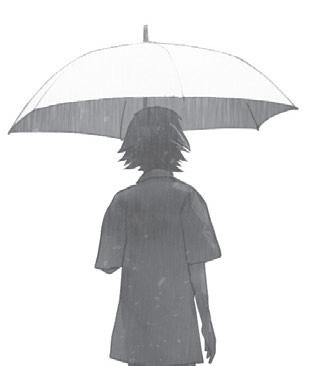
A girl who wants to escape her dreary life
Invited to a mysterious market that only opens during the rainy season, Serin is caught up in a whirlwind of adventures. She wanders the Rainfall Market in search of happiness.


A guide cat who follows the holder of the Golden Ticket
A spirit creature who looks like a cat but acts like a puppy. Issha changes size at will and guides Serin to the Dokkaebi stores that keep the futures she wants.
The Rainfall Market gatekeeper
Although he is a mountain of a man with fists the size of boulders, Toriya is meek and gentle, and does odd jobs for the Rainfall Market. He is afraid of insects and adores flowers.
Serin
Issha
Toriya


The guide to the Rainfall Market
With his immaculate purple suit and pomade-slicked hair, Durof collects people’s stories and invites guests to the Rainfall Market.
Manager of the Misfortune Pawnshop
Though she looks mean-tempered and impossible to please, Berna always gets the job done and never drops so much as a number. An avid smoker, she purchases people’s misfortunes at reasonable prices to keep the pawnshop afloat.

The Hair Salon’s senior stylist
An eager hair stylist who can bring a glossy sheen to even the most damaged of locks with a special hair oil made from compliments, Emma often trips on her own blow-dryer cords.
Durof
Berna Emma
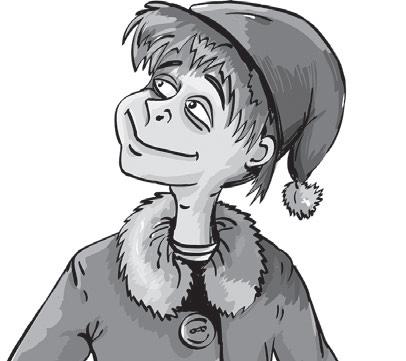

The owner of the Ruined Bookshop
A shy young Dokkaebi who just turned a hundred years old, Mata loves books and tearfully ponders what he could steal from human hearts. He was formerly friends with Haku the troublemaker.
Chef at the Giants’ Restaurant
Though constantly arguing with his younger brother, everyone agrees that his cooking is second to none. His special ingredient? A mysterious sauce made of forgotten human memories.
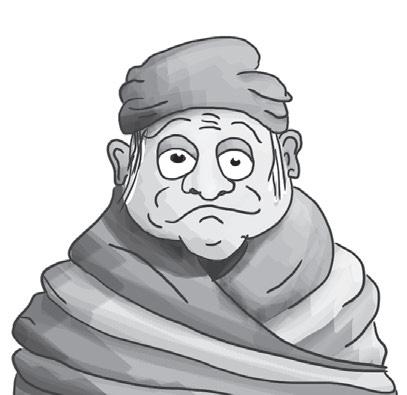
The gardener at the mischief-tree grove
An elderly Dokkaebi who brings flowers into bloom and raises towering trees with the sweat and tears humans shed in pursuit of their goals. She knows the secret about Rainbow Orbs.
Mata
Bordo
Popo
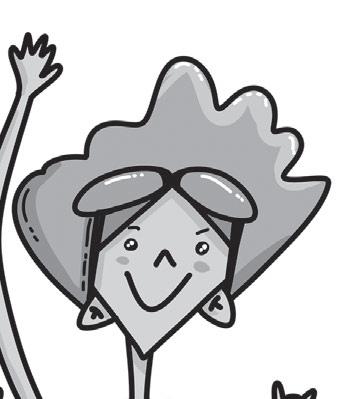
The Perfumery’s master artisan
Specializing in perfumes made with essence of human words, Nicole also sells stink sprays and scented candles. The explosions from her lab can be heard from across the Market.

Manager of the Pyramid Casino
Stealing away people’s desire to sleep at night, Gromm runs a booming round-the-clock casino. Unfortunately, he sometimes steals a little too much and falls asleep on the job.
Master of the Rainfall Market
The legendary creator of the Rainfall Market, Yan works closely with the Misfortune Pawnshop. He is the owner of the VIP lounge and lives in the penthouse at the top of the Market.
Nicole
Gromm
Yan
Prologue
Crackle . . . hiss . . .
‘Ugh, not again.’
Serin smacked the old radio impatiently; she was tired of trying to coax it back into working.
Miraculously, the weatherman’s voice returned to the speakers: ‘Due to the high-pressure front over the North Pacific, rainfall is expected over the entire Korean Peninsula next week . . .’
Serin nearly dropped the poor old radio.
It was finally here. The rainy season, and with it the answer to her prayers: the Rainfall Market.
The Strange Rumour
Somewhere far outside the big city was a place called Rainbow Town.
And somewhere in Rainbow Town was a run-down, abandoned house.
Rumour had it if you sent a letter about your misfortune to this house, you would receive a mysterious Ticket. If you brought that ticket to the house on the first day of the rainy season, you could completely change your life.
‘No way.’
‘That’s absolutely ridiculous.’
Everyone treated it as a fantasy at first. But somehow, the story spread like wildfire. And each time it was told, it became more and more elaborate.
But though the details were different, they all had one thing in common. The Dokkaebi.
‘I swear, I saw them with my own eyes!’
The people who claimed to have visited the house insisted that behind its doors was a secret, magical world with beings who called themselves Dokkaebi: people who looked human, but weren’t.
‘Don’t make me laugh.’
Naturally, people didn’t believe those stories so easily. But Serin wasn’t the only one who wanted to know more. Most people snickered when they heard about these Dokkaebi and their Tickets, but Serin would pause with her spoon halfway to
her mouth so she could learn more from the rumours. She even borrowed Secrets of the Rainfall Market at the school library, which was no easy feat considering how popular it was. Serin skipped lunch that day, and with the precious book finally in her hands, rushed to a corner of the library.
Even the cover of the book was special. The publisher had obviously spared no expense, from the way the cover changed colour when Serin held it up to the light at different angles. She stared at the cover for what seemed like forever. There was the heart-stopping quote, The truth behind the rumours finally revealed! and most importantly, the bright red BESTSELLER mark stamped on the front. Serin hated books, but she couldn’t pass this one by. She could tell other people thought the same, because the book was already badly worn, even though it had just been published.
Taking a deep breath, she gingerly opened the book.
‘Ugh, really?’
Printed on the front flap was a picture of the author. He was smiling like a robot, and someone had drawn glasses over his eyes and blackened some of his teeth with a permanent marker, so it was impossible to tell what he actually looked like.
The rest of the book wasn’t much better. Serin found doodles, of course, and even phone numbers and email addresses people had jotted down in a rush. The pencilled underlinings, she could tolerate. But some of the pages clung together with something yellow and sticky, and Serin had to try very hard to pretend not to notice those. I’m only here for information!
Despite all that, the book gripped her from the start. In the introduction, the author wrote about how he had gained entry to the Rainfall Market. He explained that his life had been hopeless once and he was often in and out of prison.
He used to be as sad as I am, Serin thought.
Each time he was released from prison, the author wrote, he had wanted to make a fresh start. But because no one would hire someone with his past, he had nowhere to go and was completely destitute.
Everything changed the day he picked up a newspaper to look for job ads. He spotted the words Tell us about your misfortune, and an address. The man had nothing left to lose. He poured out his heart on paper and sent it off by mail. To his shock, he heard back: he found a Ticket in the letterbox, alongside an invitation to a strange marketplace.
Serin wondered if she might get a Ticket. She tried to compare her life with the author’s, but it was hard to tell who had it worse.
Before she knew it, she was halfway through the book. Across the chapters, the author described the Dokkaebi he met and the wonders of the Rainfall Market. He had even included maps, almost like a travel guide. At the end of the book, the author described how he had chosen a new, happy future for himself at the Market, and how that happy life came to be. He had always wanted to be a famous writer. And not long after he had finished writing the manuscript for Secrets of the Rainfall Market, he won a deal with the biggest publishing house in the industry. The rest was history. But while helpful, that information wasn’t quite what Serin was after.
‘This is it!’
The appendix in the back had everything she’d wanted. It was the whole reason she’d borrowed the book in the first place. She turned the page and saw a list of tips for sending a good letter, one that would get chosen. The writer swore that he had spoken with other human visitors to verify these tips. This was the real deal.
‘Where did I put my pen?’
Serin pulled out a small notepad and copied down everything the appendix had to say about getting her letter accepted. It was better to be honest rather than embellish too much. Believe it or not, the author warned, Dokkaebi could read people’s hearts, so they could tell if someone was lying. He said that the Dokkaebi didn’t care as much about your writing skills as they did about your circumstances.
But is all this really real?
At the very end of the appendix, the author wrote that the Rainfall Market had changed his life when all seemed hopeless, and that if anyone reading his book felt the way he did, they had nothing to lose by writing to the Dokkaebi.
Back in the classroom, Serin could not concentrate.
And not because her teacher, who insisted on wearing modernized hanbok clothing all year round, had a big hole near his underarm. Or because part of his comb-over was hanging limp off the side, exposing his balding head.
She couldn’t stop thinking about the book.
The blackboard was almost completely white with chalk, and the teacher was lecturing passionately about history – or geography, she couldn’t quite tell – with thick drops of spittle flying everywhere. But Serin’s mind was on the Rainfall Market.
It can’t possibly be real, she told herself. She had to focus on her lessons. But shaking her head didn’t help, and only attracted the teacher’s attention.
‘Kim Serin, are you listening to me?’
The teacher was looking straight at her. Serin gasped. ‘I-I’m sorry, sir.’
The teacher frowned and pulled his comb-over back over his head, then pushed up his horn-rimmed glasses and continued the lesson. But the chalks kept breaking, and he ended
up getting mad at the blackboard, ranting about how people didn’t make things like they used to.
It felt like he was talking to her. Serin hung her head, her face bright red.
A few of her classmates glanced in her direction, but no one tried to console her. She was used to that by now.
When she got home, Serin turned on her desk lamp and, as usual, shuffled through the radio channels to find her favourite music programme.
The radio was probably once a classy bright red, but it had faded to the colour of pink rubber gloves. For a long time, it had worked surprisingly well. But recently, the old machine had needed a bit of encouragement from Serin’s hand.
‘Why does it keep acting up?’
She had a good reason for keeping the battered old radio, though: it was the last thing she had left of her father’s.
Serin didn’t remember her father. All she knew was that he died suddenly in an accident when she was young. Her mother had tried to throw the radio away many times, but Serin had insisted on keeping it.
It was her only friend. A member of the family who filled the void in her heart.
At ten in the evening, the radio played the opening song of her favourite programme.
‘Good evening. Welcome to another nightly episode of The Dream Box.’
Serin loved the DJ ’s soft, soothing voice, and normally pricked up her ears for the entire show. But not today. She placed a piece of writing paper she’d picked up on the way home on her desk, and fell deep into thought with her chin on her hands. Her pen twirled round and round in her fingers before clattering to the desktop.
‘Now for our next segment: Stories from the Listeners.’
Serin had never been the best writer. She’d written to the show many times, but they never picked her. As hope gave way to disappointment again and again, she learned that it was easier to just give up altogether.
The show went on, and eventually, Serin sat up straight. She had to do this.
The circled date on her desktop calendar said exams were coming up next week. But she could start thinking about them tomorrow. Right now, she had to focus on writing her letter. Serin looked from her notepad to her writing paper and trawled through her memories.
I’m supposed to be honest, right?
Putting pen to paper, Serin began to write. She wrote about how she lived alone with her mother, how they had already been poor before their old house caught fire and forced them to move into a semi-basement apartment with precious little sunlight. How she didn’t have money for a school uniform, and had to get hand- me- downs. How her little sister Yerin had run away from home last year and was still missing.
Serin didn’t worry about whether her letter was confusing or if the wording was poor. She wrote it all down, even the things she was too embarrassed to talk about.
‘Thank you for sharing that heartbreaking story with us. I’m sure it couldn’t have been easy. My advice is to stop blaming yourself, because you have endured more than anyone.’
As the radio went on in the background, Serin poured her heart out. When she looked up, it was almost morning. She folded up the writing paper, placed it in an envelope, and then lay down on the floor on a frayed old blanket.
Curled up asleep next to her was her mother. Serin hadn’t even noticed her come in. She must have come home in the
middle of the night after her shift at the restaurant and gone to sleep quietly because she thought Serin was studying.
Keeping her earphones in, Serin brought the radio down to the floor. It was playing her favourite song: ‘A Tomorrow Better Than Today’. She’d sung along so often that just the first few notes had her automatically mouthing the words.
‘It may feel like it’s raining. But don’t forget that there’s always a silver lining in every cloud . . .’
Finally, Serin closed her eyes.
Perhaps it was the sweet melody or that she was she simply that tired, but as soon as her head hit the pillow, she fell into a deep sleep.
The Strange Letter
She hadn’t hoped for much.
Serin knew that the more she hoped, the worse the disappointment would be. She wasn’t really desperate to go to the Rainfall Market. It was more of a dream, a vague hope that she might escape her terrible life.
Or maybe she just wanted to see if the rumours were true.
Oh well, that’s just who I am.
It had been nearly two months. Her grades dropped a little because of exams, but Serin didn’t mind. She had no chance of saving enough for university anyway. And even though her mother didn’t say so, she probably thought it was best for Serin to start working as soon as possible to help the family.
After classes, the other students went off to expensive crammers in their little cliques. Serin was the only one who headed home. It was even in the opposite direction. Her steps slowed. Serin sighed as she looked up at the endless steps that led up the hillside. They were so steep that even healthy young people like her had to be careful in rain or snow, and in the summer, she couldn’t reach the top without getting drenched in sweat. She hated these steps almost as much as she hated sitting bored in school.
Panting, she finally reached a plateau carved into the hill, which sat almost level with the tops of high-rise condos in the distance. This was the entrance to her neighbourhood, which
was mostly made up of grey houses clustered together in rows, broken up by tiny alleyways barely big enough for one person at a time. Because so many of the roofs were leaky, they were covered with orange tarpaulins held down by motley collections of tyres and old roof tiles. They would keep the tarpaulins secure even in strong winds and typhoons, hopefully.
‘Hey, it’s my turn!’
Because it was still afternoon, the alleyways were deserted, except for the children who were too young to go to school. A group of little boys whose shirts barely covered anything had piled up a heap of sand and stuck a branch on top, and were taking turns removing sand from the heap. A second later, they spotted an old man hauling up a cart full of junk and scampered over to him, not even wiping the snot from their noses. One of the boys tripped and fell, bursting into tears.
‘Careful now, boys!’ warned the old man, dressed in shorts and a sleeveless jacket for the summer. He beamed as he hugged the excited children. Lovingly, he called them ‘you rascals’ and told them to move out of the way. The rascals crowded around the back of the cart to help push it up the hill – even though they probably wouldn’t make much of a difference.
Serin let the cart pass first before stepping into the alleyway herself.
‘Meooooow!’
The second she set foot in the alley, she heard a pitiful noise. Serin scanned her surroundings and spotted a pair of eyes in a tiny gap between the houses. Slowly, she approached the little creature.
‘Hey there. Are you hungry?’
